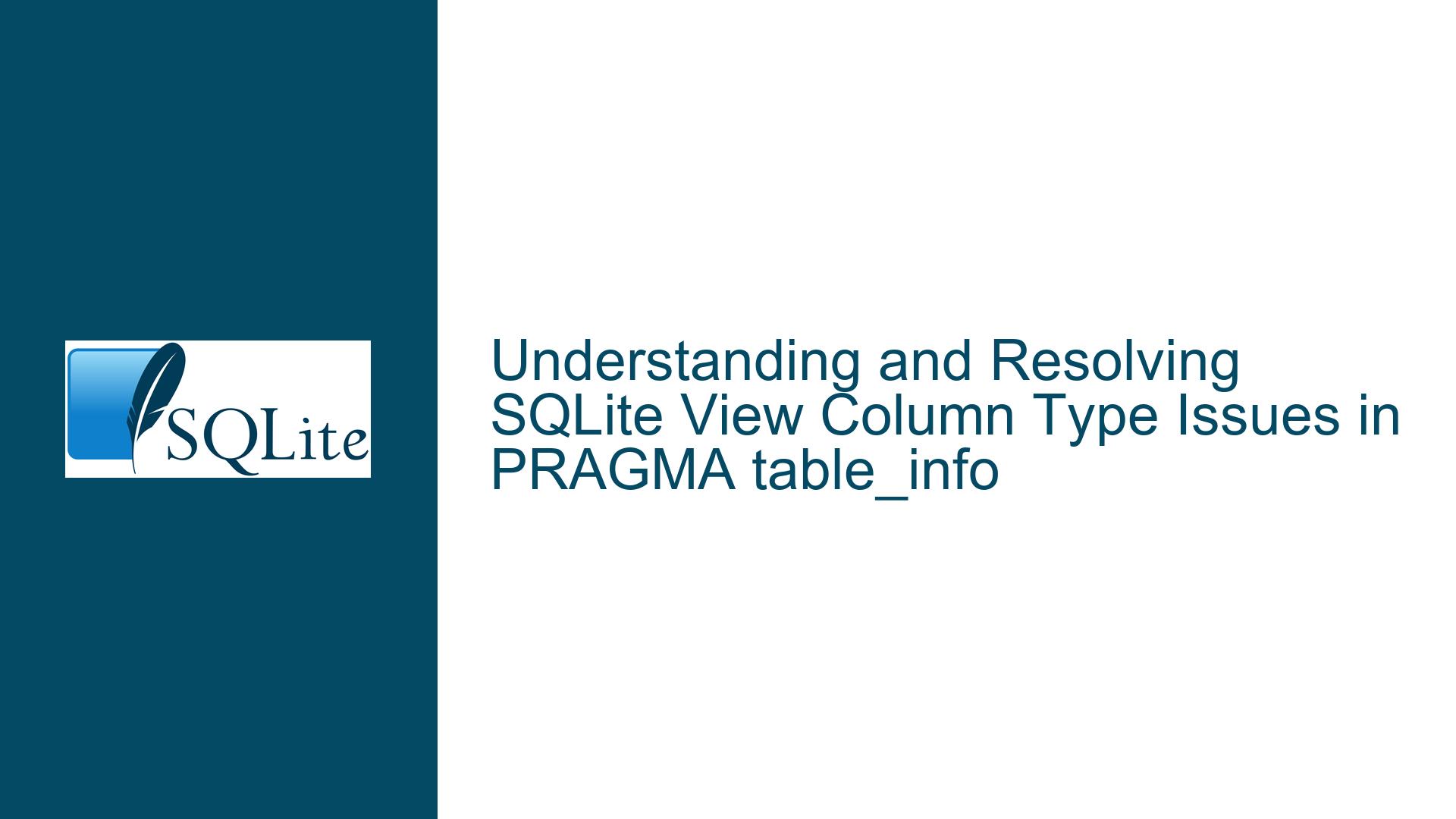and Resolving SQLite View Column Type Issues in PRAGMA table_info
Issue Overview: PRAGMA table_info Not Reflecting Column Types in SQLite Views
When working with SQLite, one of the most common tasks is to inspect the schema of tables and views using the PRAGMA table_info command. This command provides metadata about the columns in a table or view, including the column name, type, whether it can be null, its default value, and whether it is part of the primary key. However, a recurring issue arises when dealing with views, particularly when trying to ensure that the column types are correctly reflected in the output of PRAGMA table_info.
In the context of the discussion, the user is attempting to create a view with a column that should be of type INT. The user tries two approaches: first, by simply selecting a constant value, and second, by explicitly casting the value to INT. However, when inspecting the view using PRAGMA table_info, the column type is reported as NULL in SQLite version 3.37.2, which is problematic for their use case. The user needs the column type to be correctly identified as INT because they are working with a GeoPackage file that must pass validation by a script (validate_gpkg.py). This script checks that all columns in tables and views have types that belong to a list of allowed types, and NULL is not an allowed type.
Interestingly, the behavior changes in later versions of SQLite (3.44.2 and 3.47.0), where the column type is correctly reported as INT when using the CAST function. This discrepancy between versions highlights a subtle but important nuance in how SQLite handles view column types, particularly when it comes to type inference and casting.
Possible Causes: Why PRAGMA table_info Might Not Reflect Column Types in Views
The issue of PRAGMA table_info not correctly reflecting column types in views can be attributed to several factors, including differences in SQLite versions, the way SQLite handles type inference in views, and the specific use of the CAST function.
1. SQLite Version Differences:
The behavior of PRAGMA table_info with respect to view column types has evolved over time. In earlier versions of SQLite (e.g., 3.37.2), the type information for columns in views was not always correctly inferred, especially when the column was derived from a constant or an expression. This is evident in the discussion, where the column type is reported as NULL in version 3.37.2 but correctly as INT in versions 3.44.2 and 3.47.0. The change in behavior is due to a commit made on 2022-12-14, which improved the handling of type information in views.
2. Type Inference in Views:
SQLite uses a process called type inference to determine the type of a column in a view. When a view is created, SQLite attempts to infer the type of each column based on the expressions used in the SELECT statement. However, this inference process is not always straightforward, especially when dealing with constants or complex expressions. In the case of a constant value like 42, SQLite may not have enough information to infer the type, leading to a NULL type in the PRAGMA table_info output.
3. Use of the CAST Function:
The CAST function in SQLite is used to explicitly convert a value to a specified type. When used in a view definition, it provides SQLite with explicit type information that can be used during type inference. However, the effectiveness of the CAST function in influencing the type information reported by PRAGMA table_info depends on the SQLite version. In earlier versions, the CAST function might not have been sufficient to ensure that the type information was correctly reflected in the view metadata. This is why the user observed different behaviors between SQLite versions.
4. GeoPackage Validation Requirements:
The user’s specific use case involves validating a GeoPackage file using a script that checks the column types of all tables and views. The script relies on PRAGMA table_info to retrieve the column types and expects them to belong to a list of allowed types. Since NULL is not an allowed type, the validation fails when the column type is not correctly identified. This requirement adds an additional layer of complexity, as the user needs to ensure that the column types are not only correct but also recognized by the validation script.
Troubleshooting Steps, Solutions & Fixes: Ensuring Correct Column Types in SQLite Views
To address the issue of PRAGMA table_info not correctly reflecting column types in views, particularly in the context of GeoPackage validation, several steps can be taken. These steps include upgrading SQLite, using explicit type definitions, and employing workarounds for older versions.
1. Upgrade SQLite:
The most straightforward solution is to upgrade to a newer version of SQLite that correctly handles type inference in views. As demonstrated in the discussion, versions 3.44.2 and 3.47.0 correctly report the column type as INT when using the CAST function. Upgrading to a newer version ensures that the type information is accurately reflected in the PRAGMA table_info output, which is crucial for passing the GeoPackage validation.
2. Use Explicit Type Definitions:
In cases where upgrading SQLite is not feasible, or when working with older versions, it is important to use explicit type definitions in the view creation statement. The CAST function can be used to explicitly specify the type of a column, as shown in the following example:
CREATE VIEW foo AS SELECT CAST(42 AS INT) AS mycol;
This approach provides SQLite with explicit type information, which can help improve the accuracy of type inference. However, as noted earlier, the effectiveness of this approach depends on the SQLite version.
3. Use Subqueries with Explicit Column Types:
Another approach is to use subqueries with explicit column types. This can be particularly useful when dealing with more complex views where type inference might be less reliable. For example:
CREATE VIEW foo AS SELECT mycol FROM (SELECT CAST(42 AS INT) AS mycol);
By using a subquery with an explicit column type, you can ensure that the type information is correctly propagated to the outer query and reflected in the PRAGMA table_info output.
4. Modify the Validation Script:
If upgrading SQLite or modifying the view definition is not an option, an alternative approach is to modify the validation script (validate_gpkg.py) to handle cases where the column type is NULL. This could involve adding logic to infer the type based on the column name or other metadata, or to allow NULL types in certain cases. However, this approach should be used with caution, as it may introduce additional complexity and potential for errors.
5. Use Temporary Tables for Validation:
In some cases, it may be possible to use temporary tables as a workaround for validation. Temporary tables can be created with explicit column types, and the data from the view can be inserted into the temporary table for validation. For example:
CREATE TEMPORARY TABLE temp_foo AS SELECT CAST(42 AS INT) AS mycol;
The validation script can then inspect the temporary table using PRAGMA table_info, which should correctly reflect the column types. Once validation is complete, the temporary table can be dropped.
6. Leverage SQLite’s Type Affinity:
SQLite uses a concept called type affinity to determine how values are stored and treated in columns. While type affinity is not the same as a strict type system, it can be used to influence how SQLite handles column types. For example, if a column is defined with INTEGER affinity, SQLite will attempt to store values as integers. This can be useful when creating views, as it provides additional hints to SQLite about the intended type of the column.
7. Use SQLite’s STRICT Tables (if available):
Starting with SQLite version 3.37.0, the STRICT table mode was introduced, which enforces stricter type checking for columns. While this feature is primarily intended for tables, it can also be used to ensure that columns in views have explicit types. However, this approach requires that the underlying tables used in the view are created with the STRICT mode, which may not always be feasible.
8. Consult SQLite Documentation and Community:
Finally, it is always a good idea to consult the SQLite documentation and community for additional insights and solutions. The SQLite documentation provides detailed information on type inference, type affinity, and the behavior of PRAGMA table_info. Additionally, the SQLite community, including forums and mailing lists, can be a valuable resource for troubleshooting and finding workarounds for specific issues.
In conclusion, the issue of PRAGMA table_info not correctly reflecting column types in SQLite views is a nuanced problem that can be influenced by SQLite version differences, type inference mechanisms, and the use of explicit type definitions. By upgrading SQLite, using explicit type definitions, and employing workarounds for older versions, it is possible to ensure that the column types are correctly identified and validated. Additionally, modifying the validation script or using temporary tables can provide alternative solutions for specific use cases. Understanding these factors and applying the appropriate solutions will help ensure that your SQLite views are correctly defined and validated, particularly in the context of GeoPackage files.






